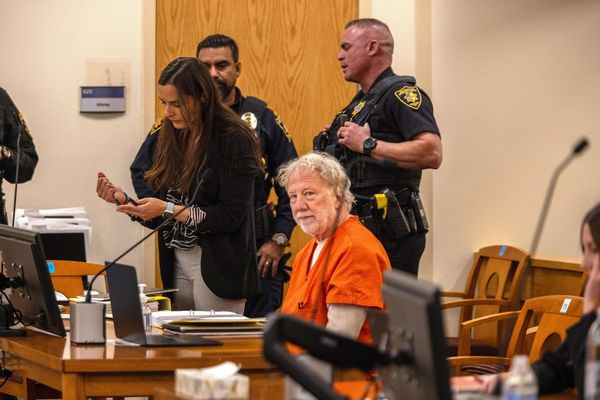
Legislation that would force hundreds of non-citizens to facilitate their own deportation or face imprisonment has been rushed through the lower house, despite warnings it breaches human rights obligations.
The Labor government combined with Peter Dutton’s opposition shortly before question time on Tuesday to approve the new powers for the immigration minister despite howls of dissent from independents and minor parties about lack of due process.
After the bill was introduced at noon, Labor and the Coalition gagged debate after a little over two hours. The migration amendment (removals and other measures) bill passed to the Senate, where it will be considered by a two-hour inquiry hearing on Tuesday evening before possible passage on Wednesday.
The bill gives the minister the power to direct a non-citizen who is due to be deported “to do specified things necessary to facilitate their removal”, or risk a mandatory minimum sentence of one year in prison or up to five years.
The Greens, independents, Refugee Council of Australia and Kaldor Centre for International Refugee Law have raised concerns that the bill applies to those who had “fast-track” assessment of their protection claims, which Labor criticised in opposition.
“We are concerned that those who do have strong claims, but have not had a fair hearing or review, will be sent back to real harm,” the Refugee Council chief executive officer, Paul Power, said.
At the Tuesday inquiry hearing, home affairs officials said the bill would apply to people whose claim for refugee protection had been finally resolved, but could not say how many were assessed by the fast track.
They said the bill would apply to at least 150 to 200 people in detention, people on bridging visa R including those released by the NZYQ high court decision, and an unspecified number on other bridging visas on a pathway to removal.
But the Greens senator David Shoebridge noted there was “no limit” to the minister using regulation to add visa classes to the list of those who can be given directions.
In parliament, the independent MP Kylea Tink argued the bill breached Australia’s obligation not to forcibly return asylum seekers to their country of persecution.
The independent MP Zoe Daniel warned that “if we make a mistake here” people may be taken back to their country of persecution and “murdered”.
The most contentious provision states that it is not a “reasonable excuse” to the new offence of refusing a direction that the person “has a genuine fear of suffering persecution or significant harm if the person were removed”.
The Human Rights Law Centre said the provisions “will apply to people who have serious and legitimate claims for protection”.
“They risk serious non-compliance with Australia’s obligations under the refugee convention as well as other international instruments.
“The bill deliberately separates families,” it said. “The minister can require a person to comply with a direction in relation to their removal, irrespective of the impact this would have on their spouse, children or other family members.”
The Greens leader, Adam Bandt, warned the bill meant “a mum who refuses to sign a passport application for her children to be returned to Iran where they have a fear of persecution could be put in jail”. He noted this carried a mandatory minimum sentence of a year in prison, in apparent breach of Labor’s platform.
In the hearing, the home affairs general counsel Clare Sharp said the “legislation doesn’t prevent [family separation] from happening, it’s possible”, but it may be a reason the minister may grant a person a visa.
In question time, Tink noted the bill can force guardians “to take actions in the aid of having their children removed from Australia”.
The immigration minister, Andrew Giles, noted the bill contains a “safeguard which deals with children”, that is, that children cannot be issued directions to facilitate their own deportation.
Giles claimed that the bill was “consistent with Australia’s human rights obligations”. In fact, the statement of compatibility said it was consistent in “most respects” but to the extent it limits human rights it does so “in order to maintain the integrity of the migration system”.
“What we’re doing with … this important piece of legislation is to fill a very significant loophole, that a small cohort of people who have no basis upon which to remain in Australia are refusing to cooperate with efforts to affect their removal.”
Giles said that those affected were “not refugees”. The bill’s explanatory memorandum says those who have “been found to engage Australia’s protection obligations … cannot be directed to interact with or be removed” to their country of persecution, but can be directed to do things to be removed to a “safe third country”.
The bill also creates a power for the government to designate another country as a “removal concern country”, which will impose a bar on new visa applications from non-citizens outside Australia who are nationals of a country that does not accept removals from Australia.
The power could affect applicants hoping to leave countries including Russia, Iran, Iraq and South Sudan.
Shoebridge said that “entire communities” in Australia face being permanently barred from visits from relatives from those countries.
The Refugee Legal executive director, David Manne, said this aspect of the bill was “discriminatory and extreme overreach”.
Govt’s seeking to rush new visa ban laws on people from countries who’d normally be able to come here, purely because they hold the same nationality as people already here who can't be deported. It’s draconian, discriminatory and extreme overreach. @RefugeeLegal
— David Manne (@david_manne) March 26, 2024
The shadow immigration minister, Dan Tehan, told Guardian Australia the Coalition was worried if the bill “doesn’t work as intended, it could force people to get more desperate and jump on boats” if their country is designated.
The independent senator David Pocock said it was “incredibly disappointing” that Labor was rushing the bill through, accusing the major parties of “disgraceful” treatment of independents who had raised concerns about the bill.







